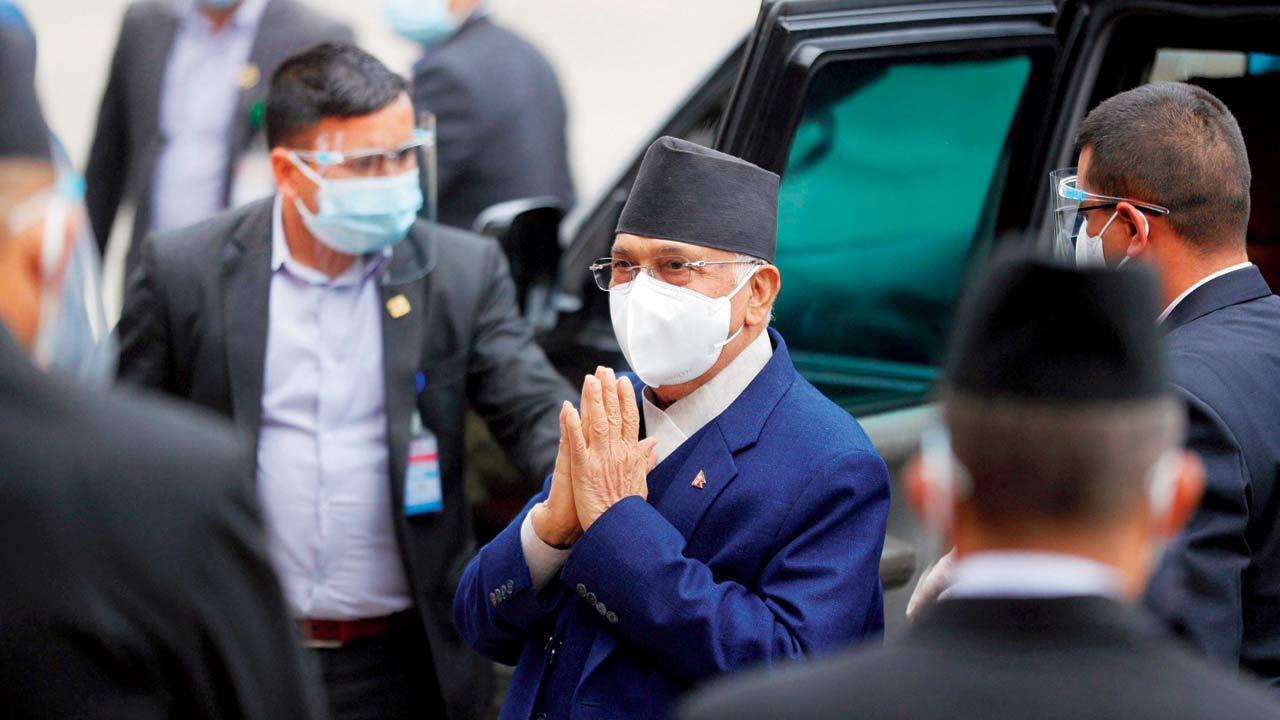Nepal President Bidya Devi Bhandari had asked the Opposition parties to come up with the support of majority lawmakers to form a new government by 9 pm Thursday after Oli, 69, lost a crucial trust vote on Monday.

Nepal PM Khadga Prasad Oli. Pic/ PTI
K P Sharma Oli was reappointed as Nepal Prime Minister on Thursday after the Opposition parties, riddled by factionalism, failed to secure majority seats in Parliament to form a new government.
ADVERTISEMENT
Nepal President Bidya Devi Bhandari had asked the Opposition parties to come up with the support of majority lawmakers to form a new government by 9 pm Thursday after Oli, 69, lost a crucial trust vote on Monday.
The Nepali Congress (NC) under the leadership of party president Sher Bahadur Deuba on Tuesday had announced its intention to stake a claim for the prime minister's post.
Also Read: Nepal Prime Minister K P Sharma Oli loses vote of confidence in House of Representatives
Though Deuba had received support from Communist Party of Nepal (Maoist) chairman Pushpa Kamal Dahal 'Prachanda', a meeting of current and former NC office bearers at the party president's residence on Thursday concluded that the sharp division within the Janata Samajbadi Party (JSP) whether to support the NC-led government had made the formation of an alternative government impossible.
A Standing Committee meeting of the Maoist Centre held at the party's headquarters on Thursday also concluded that the formation of an alternative government was not possible. The Maoist Centre had earlier decided to support the formation of a NC-led coalition government.
Following the Opposition's failure to prove its majority in Parliament, Oli is expected to stake his claim to form the government.
Subsequently, President Bhandari reappointed Oli, whose party has 121 seats in Parliament, as the prime minister. He will take the oath of office tomorrow.
However, as per rules, Oli is required to win the vote of confidence within 30 days from the date of the appointment.
The NC had earlier planned to form a new government with the support of Communist Party of Nepal (Maoist Centre), JSP and the Madhav Kumar Nepal-led faction of the ruling NCP-UML (Unified Marxist-Leninist).
The plan failed to materialise as there was an agreement between chairman Oli and rival faction leader Nepal within the UML and Upendra Yadav and Baburam Bhattarai-led faction of the JSP failed to secure a majority in the party.
Oli and Nepal had held a four-hour-long meeting to resolve their differences amid the threat of lawmakers close to the Nepal-led faction in the party to resign en masse if their demands were not met. The two leaders have agreed to form a 10-member task force to settle the differences seen in the party.
Nepal plunged into a political crisis on December 20 last year after President Bhandari dissolved the House and announced fresh elections on April 30 and May 10 at the recommendation of Prime Minister Oli, amidst a tussle for power within the ruling Nepal Communist Party (NCP).
Oli's move to dissolve the House sparked protests from a large section of the NCP led by his rival 'Prachanda'.
In February, the apex court reinstated the dissolved House, in a setback to Oli who was preparing for snap polls. Known for his pro-China stance, Oli had earlier served as the country's prime minister from October 11, 2015 to August 3, 2016 during which Kathmandu's ties with New Delhi had strained.
Nepal's Covid-19 cases reached 431,191 as 8,842 fresh cases were reported in the past 24 hours on Thursday. As many as 214 more deaths were also logged, taking the national toll to 4,466.
This story has been sourced from a third party syndicated feed, agencies. Mid-day accepts no responsibility or liability for its dependability, trustworthiness, reliability and data of the text. Mid-day management/mid-day.com reserves the sole right to alter, delete or remove (without notice) the content in its absolute discretion for any reason whatsoever.
 Subscribe today by clicking the link and stay updated with the latest news!" Click here!
Subscribe today by clicking the link and stay updated with the latest news!" Click here!






